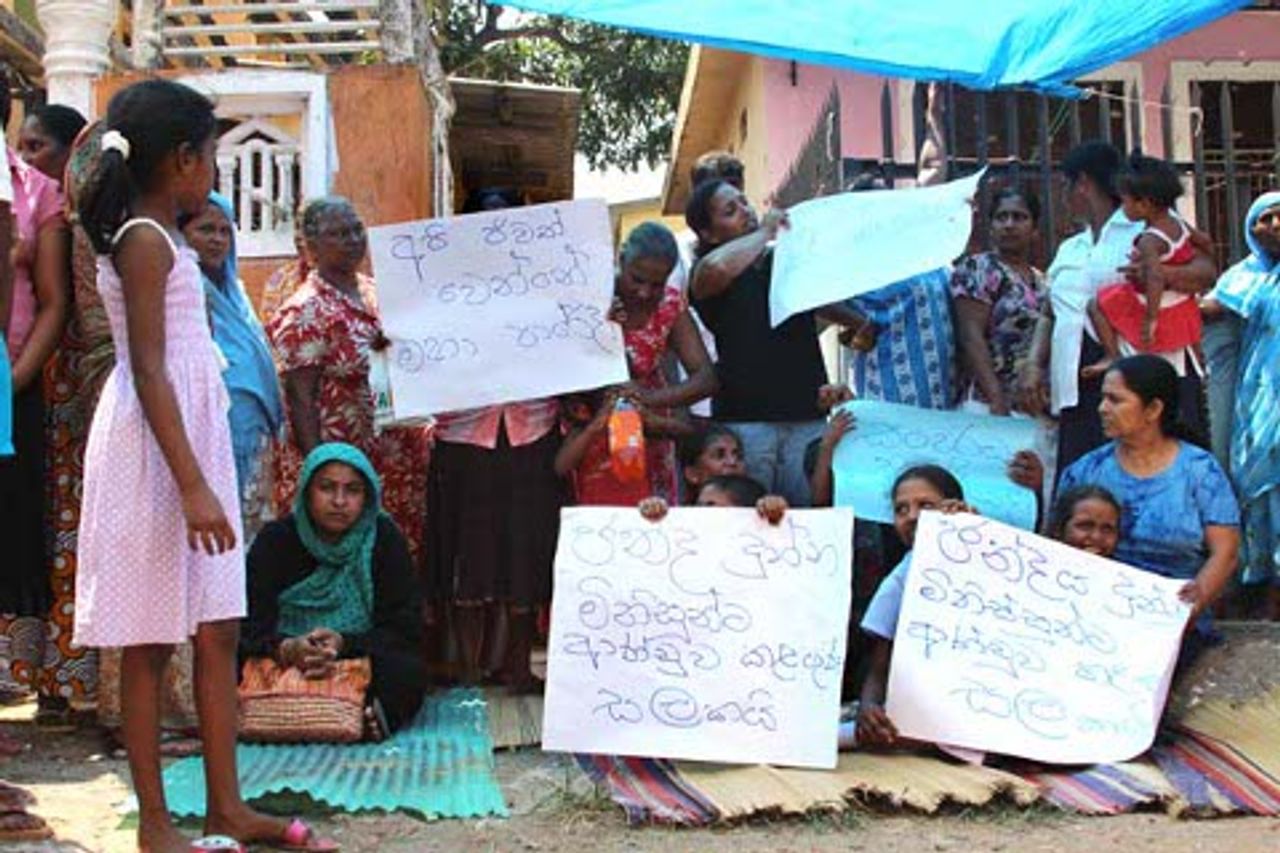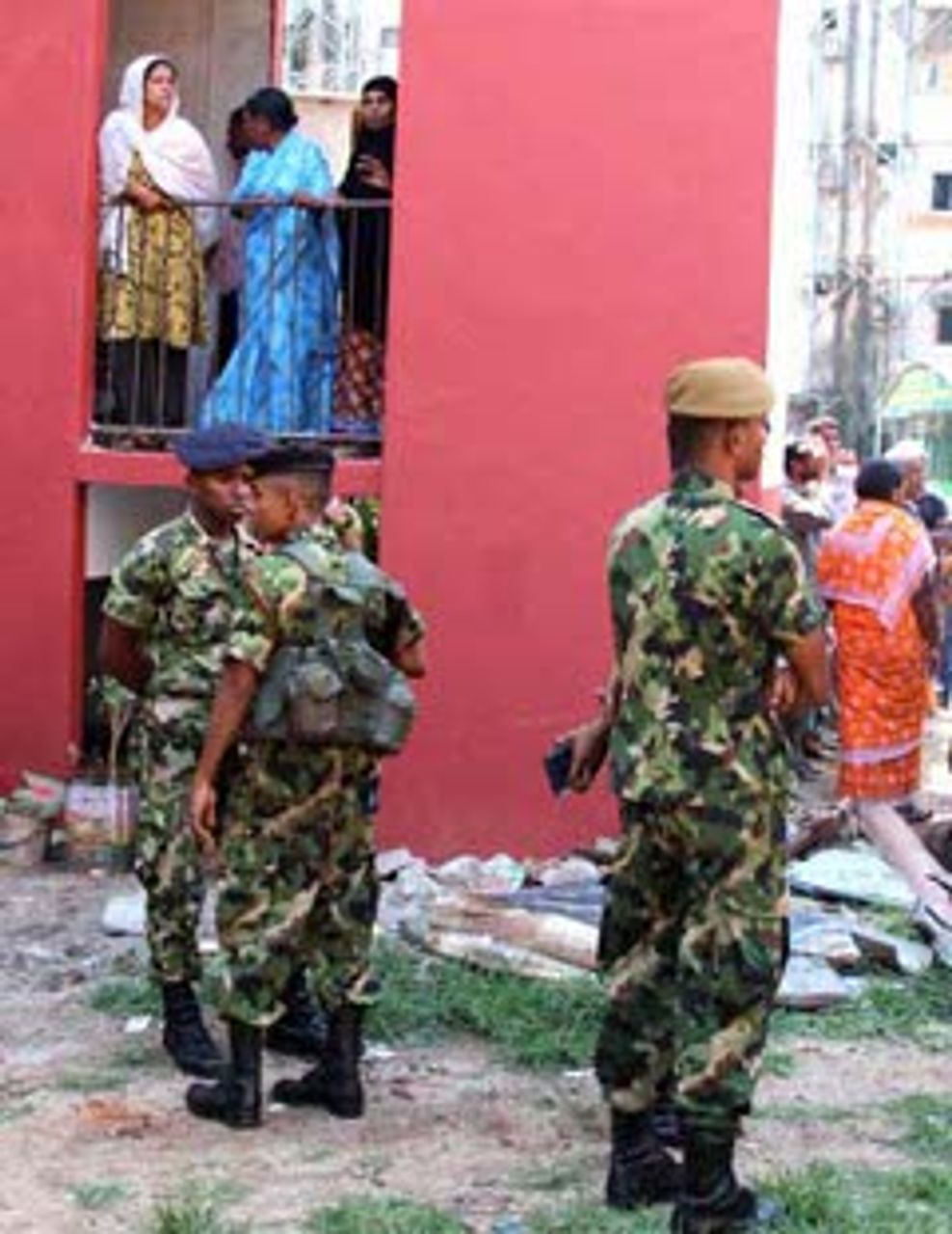Protesting residents from Colombo’s Maligawatta flats defied riot police and other government personnel sent to demolish extensions to their tiny flats on March 1. More than 100 people, mainly women and children, picketed to stop the destruction, holding placards that read: “We voted for this government but this is how they treat us” and “Do we have to live on the road?”
 Picketing residents
Picketing residentsHousing affairs minister Wimal Weerawansa ordered the demolition of all “unauthorised” construction in public housing schemes in Colombo as part of the Rajapakse government’s attempts to transform the city into a South Asian financial hub.
Truckloads of police encircled the Maligawatta flats at 8.30 a.m. on March 1. Special Task Force (STF) personnel and riot police with water cannons were on standby to suppress any opposition. Residents, however, confronted the police and Condominium Management Authority (CMA) chairman Kapila Gamage and then prevented a bulldozer from carrying out the demolitions.
The CMA, which is connected to the housing ministry, had previously attempted to pull down the extensions in mid-February but was forced to retreat in the face of residents’ opposition. It then issued a one-week deadline, which was later extended to March 1. While the CMA was forced to postpone last week’s operation, it has sent letters to every family ordering them to remove any “unauthorised” constructions and warning that if they failed to do so, authorities would carry out the demolitions and make them pay the cost.
Maligawatta residents added new rooms to their flats when their families expanded and did so with permission from the Urban Development Authority (UDA). The CMA falsely asserts that the extensions prevent government authorities from cleaning the drains. Residents have categorically rejected this claim, pointing out that they have been cleaning the drains for the past 38 years, not government authorities.
 Special Task Force personnel on standby
Special Task Force personnel on standbyLawyer Khrishantha Nishantha, who lives in the flats, told an impromptu press conference on March 1 that the CMA’s efforts to destroy the extensions were illegal without a court order or official permission. He showed the media a copy of a UDA letter authorising the constructions. Nishantha said: “These houses are our private property. No one can remove them. We have the deed to these houses and when officials valued our houses it included the new constructions.”
According to government statistics, 1,700 families live in the 1,512 housing units in the Maligawatta National Housing Scheme. The tiny units, which were built in 1973 and 1978, have just one bedroom, a small living room, a kitchen and a toilet. No new government housing was built for the growing families, forcing residents to build additional rooms.
Socialist Equality Party (SEP) supporters, who have regularly campaigned among Maligawatta residents, distributed a leaflet opposing the demolitions and explaining the government’s agenda.
“The Rajapakse government is planning mass evictions in Colombo as part of its attempts to transform Colombo city into a South Asian business hub,” the leaflet stated. “In order to suppress opposition, Rajapakse placed the UDA under the authority of the defence ministry, which also commands the military. These flats are being ‘repaired’ for the first time after 38 years as a part of the so-called beautification project of government to attract investors and tourists to the city.”
In 2008 and 2010, the government evicted hundreds of families from Slave Island and Dematagoda in Colombo, deploying the army and police to enforce its orders. Many residents were forced into temporary wooden huts outside the city and without basic facilities.
Colombo municipal councillor Mahinda Kahandagama visited the Maligawatta flats, pleading with residents to “just allow the removal of three feet [one metre] from the back of the flats.” Kahandagama is from the Democratic Left Front (DLF), which is allied with Rajapakse’s United Peoples Freedom Alliance (UPFA). Residents opposed his pathetic attempt at a so-called compromise and he was forced to leave the area.
Opposition United National Party (UNP) MP Sujeeva Senasinghe told angry residents that his party opposed the destruction of the extensions and promised to help them file court action against the CMA. He had previously pledged to take legal action against the eviction of Slave Island residents, but he failed to stop any evictions. When in power, Senasinghe’s UNP did not hesitate to evict public housing tenants.
During recent municipal elections, Colombo’s UNP mayor, M. Muzammil, claimed to oppose the Rajapakse administration’s moves to evict 75,000 slum dwellers. He has now expressed his readiness to cooperate with the government’s “development” and “beautification” plans.
The eviction of thousands of urban poor from Colombo cannot be stopped by protests aimed at pressuring the Rajapakse government or municipal authorities to change course. This attack is part of the government’s broader agenda and the austerity measures dictated to it by the International Monetary Fund (IMF).
What is required is the mobilisation of all working people—urban and rural—as part of a unified political struggle against the Rajapakse government and for a program that defends housing as a basic social right and allocates billions of rupees for decent homes for the needy.
The SEP appeals to all working people to oppose the government’s attacks on public housing tenants and calls for the formation of Independent Action Committees to Defend the Right to Housing as part of the struggle to defend the living standards and basic rights of all working people. The establishment of decent housing for all cannot be realised within the profit-seeking and crisis-ridden capitalist system but only through the establishment of a workers’ and farmers’ government based on a socialist program.
The authors also recommend:
Sri Lankan opposition party backs Colombo slum evictions
[19 December 2011]
Sri Lankan government intensifies Colombo evictions
[27 January 2011]
